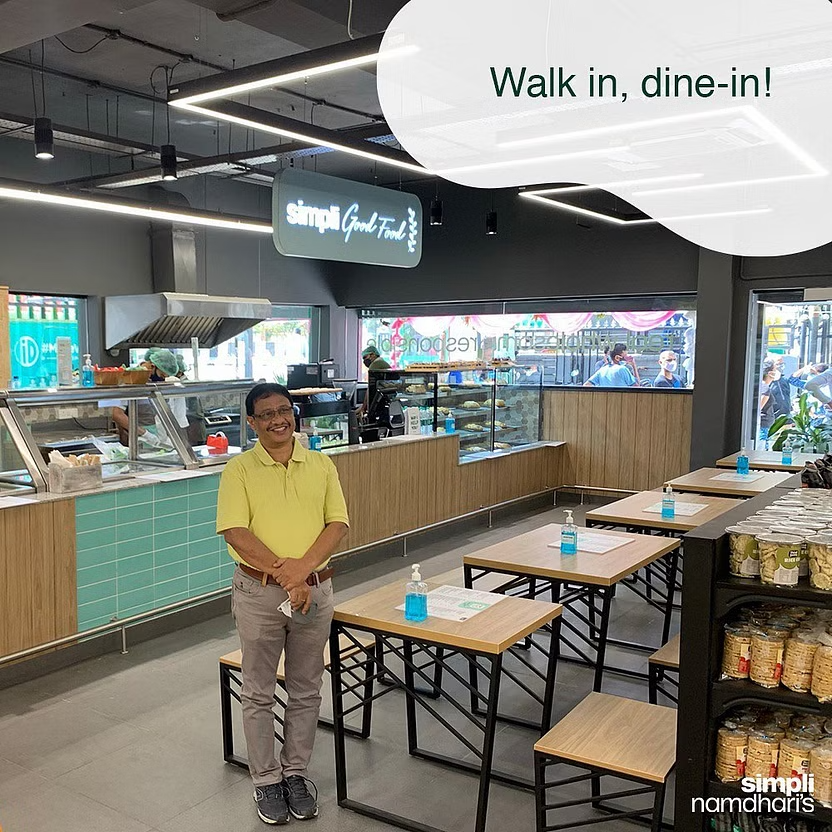The brand recently opened a flagship store in Hyderabad, and now plans to launch stores in Pune and Chennai as well.
In a city like Bengaluru, where there is a supermarket at every corner, it becomes challenging for brands to make a name for themselves in this crowded space. There are retail stores like Ratnadeep Supermarket, Nature’s Basket, More Hypermarket, Nilgiris, Reliance Fresh and CeeKay Supermarket. Then there is Simpli Namdhari’s, the omnichannel retail brand owned by Namdhari’s Group, which has been on an expansion journey in South India.
From fresh, pesticide-free fruits and organic vegetables, to groceries to fresh farm to fork concept, the first Namdhari’s store was launched in Bengaluru in 2001. The first Simpli Namdhari’s store was launched in 2019, and it now has 10 stores in the city.
The brand recently opened a flagship store in Hyderabad, and plans to launch three more stores in the city in the coming months. With this launch, the brand plans to bring the farm to fork concept to Hyderabad and provide people with an upgraded grocery shopping experience.
Hema L, head of brand marketing, Simpli Namdhari’s, says that the brand plans to open 40 more stores across India over the next three years.
“We will be targeting the southern markets. Apart from Bengaluru and Hyderabad, we will also be launching stores in Pune and Chennai.”
Experience stores
To stand out of the competitive supermarket landscape in Bengaluru, the brand has been trying different formats, as per consumer preferences. It opened a cafe/experience store in JP Nagar. It also has a Simpli Good Food cafe for salads, cold-pressed juices, etc.
According to Hema, Simpli Good Food cafe is one-of-a-kind experience in Bengaluru.

“We launched this concept in 2000 itself. We had a small salad bar, which included Russian/Caesar salads, and a range of imported spreads and jams. People used to visit Namdhari’s stores for these salads, jams and bakery products. With the launch of Simpli Namdhari’s, we expanded the cafe and wanted to give our customers a QSR sort of cafe experience in a supermarket.”
The brand has also created AR/VR experiences in its stores.
“The majority of our TG, are overseas travellers. They would have experienced a couple of things internationally, and would expect a similar kind of experience when they walk into our stores. So, we have created AR/VR experiences in our stores,” shares Hema.
“The international customers can actually experience how the product is actually grown from the seed. From sowing to sapling to our quality control measures to the supply chain control and how the products are transferred into our stores; the entire chain of the growing process can be experienced through these VR/AR technologies.”
Marketing initiatives
Post-COVID, online grocery shopping has become quite popular, owing to a combination of reasons, including changing lifestyles.
According to IMARC Group, the Indian online grocery market size was worth $6.8 billion in 2022. The market is expected to touch $37 billion by 2028, exhibiting a CAGR of 31.3% during 2023-28.
Keeping this in mind, the brand has been making efforts in the digital space to connect with its TG.
“Through strategic initiatives, such as social media campaigns, influencer collaborations and targeted content marketing, we have successfully grown our customer base by 100% over the last year and increased our social media following by 15x,” states Hema.
“Our data-driven approach allows us to optimise campaigns, identify trends and make informed decisions that positively impact our growth. Through this approach, we have been able to increase the NOBs by 78% over the last year and footfalls by 150%.”
The brand recently launched a digital campaign, called ‘Shop free with Simpli Namdhari’s’, where it encouraged people to shop for Rs 3,000 to get vouchers worth Rs 3,000 that can be redeemed over a period of three months.
“This campaign resulted in a CTR of over 32%. Additionally, we are carrying out our ‘Choose goodness’ campaign through offline activities like Walkathon around World Environment Day, Yogathon around International Yoga Day, etc., which has seen a positive engagement online and increased our store footfall by 100%,” adds Hema.
The offline stores are the brand’s main sales driver, but it has also started focussing on e-commerce and subscription.
“80% of our sales come from offline stores and 20% from e-commerce and subscription channels,” informs Hema.
Going forward, the grocery market is going to expand, as there are many brands entering this space, says Hema.
“With brands like Reliance providing products at a competitive price, it becomes very challenging for other retailers. The competition will be quite aggressive over the next couple of years.”




































